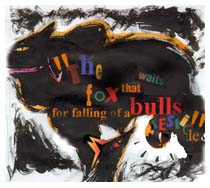

|
|
|
|
| HOME | LIFE/STYLE | COLUMNISTS | SAVAGE GRACE | |||
| December 27, 1997 |
Manjula Padmanabhan
A man scalded by milk blows on yoghurt Winter is the season for migratory humans. This year, a friend
brought a small booklet which he had picked up in Mongolia. It's
called Pearl Rosary of Wisdom: a concise dictionary of English-
Mongolian and Mongolian-English proverbs.
Winter is the season for migratory humans. This year, a friend
brought a small booklet which he had picked up in Mongolia. It's
called Pearl Rosary of Wisdom: a concise dictionary of English-
Mongolian and Mongolian-English proverbs.
In his preface, the author Go. AKIM states that his purpose is to juxtapose the proverbs of Mongolia with equivalent ones in English, thereby revealing the similarities which connect dissimilar societies. As he points out, by an interesting coincidence, a character in Gabriel Garcia Marques' novel One Hundred Years of Solitude, cries from within his mother's womb, while the hero of the Mongolian epic Geser is said to have sung from within his mother's womb. Despite the distance of a planet between them, two fictional characters reveal that they have a shared birthplace in the imagination of the human mind. The 555 proverbs of the dictionary make the same point. The author has organised them so that the reader can find a proverb in one language, then read its translation as well as its equivalent in the other language. What is charming and amusing is the way in which the most familiar ones are transformed by their context and the combined caprices of translators and proof-readers. For instance, "More powerful, gathered magpies, than unassembled tigers" and "United magpies nag a dragon to death" are the Mongolian versions of "United we stand, divided we fall!" Here are a few other examples: "Out of the wolf's mouth into the tiger's mouth" for "Out of the frying-pan into the fire." "To be a king in his black yurt (circular tent) and a lord in his grey yurt" for "An Englishman's home is his castle." "Don't tuck up your shirt before you get to the mountain, don't take off your shoes before you get to the river" for "Cross that bridge when you come to it." "A man scalded by milk blows on yoghurt" for "Once bitten, twice shy." "He sees not the camel on his own head, but notices the straw on another's head" for Christ's admonition to remove the plank from one's own eye before complaining about the splinter in another's. Some of the sayings are either so badly translated that they make no sense or they are too exotic to find an echo in a non-Mongolian reader: "A draft hamster is put to death because of its ill-words"; "When meat is in lack, a radius is best" and "Set the mouse to make an incense offering, the cat to keep the meat." Others are obvious enough; they don't require translations: "Thousand camels slip on the droppings of one camel"; "To cry after the thunderclap"; "What is joke for a cat will be death for a mouse"; "The fox that waits for falling of a bull's testicles, starves"; "Two far away seas, united by clouds and mist"; "Vodka slips into the mouth like a golden mosquito but roars out like a mammoth." And some are so familiar they could have been coined in downtown Bhopal: "Don't strew earth in your own wine-cup"; "A man takes care of his name, a peacock of his tail"; "If you are wealthy, many relatives, if you are poor, many enemies." Proverbs reflect the unconscious values of a society. Black, for instance, is so obviously unsavoury that "Crow laughs at the pig for being black". The social position of daughters is made clear by: "One daughter is better than none" and "Judge a son by a work, a daughter by a needle-work." A camel's physical charms assumed to be nil as in: "Although a camel is ugly, he likes his young." And they are slyly knowing, as in this one: "Penis of a silent man is damp." Its nearest equivalent is given as "Dumb dogs are dangerous!" One feature that all the examples given in the book have in common, which ever culture they belong to, is that their origin appears to be ancient rather than modern. I have been trying to think of up-to-date proverbs and the only one which came readily to mind was "The other line moves faster." Yet that could just as easily belong to the middle ages as to a bus queue. What are the proverbs of today? Here are a few of mine: "There's never any traffic when you're early"; "The power-cut lasts only as long as your deadline"; "There's no colour as fast as the one that runs from one fabric onto another"; "Luggage checked-in first, exits last". Do you have any proverbs to share? Keep in mind, it's not enough merely to substitute new terms for old. The situation itself should be contemporary. If enough of you send in suggestions, I'll print them in my next column. And if that's not incentive enough, here's one more: a set of my postcards for the most original and witty maxim to reach me!
|
|
HOME |
NEWS |
BUSINESS |
CRICKET |
MOVIES |
CHAT
INFOTECH | TRAVEL | LIFE/STYLE | FREEDOM | FEEDBACK |
|